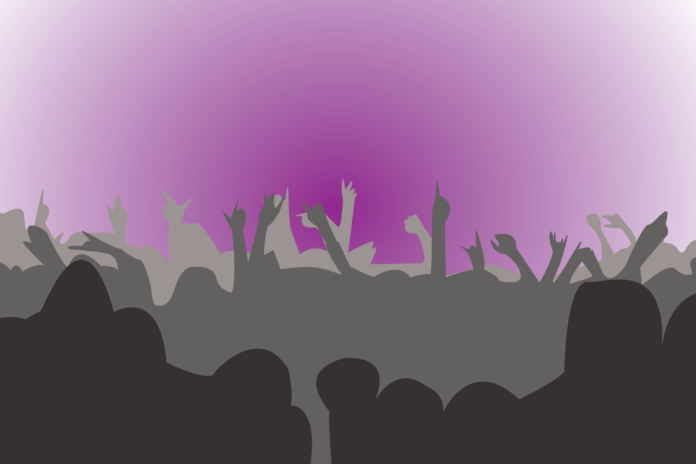How to act appropriately at a concert from a frequent concert-goer
By MICHELLE MENDOZA — mimendoza@ucdavis.edu
Not too long ago, Davis students were graced with a thrilling hour-long set by Remi Wolf at Sunset Fest. As a fan, I was excited to get the chance to see her band for free. The atmosphere was perfect; it was the Friday of Halloweekend, people were dressed in costume and a bright, full moon was out.
I have been to many concerts since the sixth grade. My first concert was The Neighbourhood’s “Sweater Weather” tour. Standing in a crowd made up of mostly tall people smelling faintly of cigarettes, it was difficult to fully enjoy the experience. However, a few audience members realized that I couldn’t see and asked if I wanted to move in front. I was surprised by the kind gesture and it made the concert even better.
I was a bit farther away from the stage at Sunset Fest than I was at my first concert. This time, my friend was the one who couldn’t see past the shoulders of the person in front of her. As Remi’s set grew closer, people became more desperate to get a better view. They pushed forward and elbowed each other in retaliation. The most frustrating part was, during the performance, some people felt the need to move on top of each other’s shoulders. We decided that we wanted to leave the crowd, but it was difficult for others to move aside to let us pass.
Even though I have my complaints, the crowd was fine overall, and Remi put on a great show. Ten years to the day, these events made me want to reflect on concert etiquette and how it has changed.
Concert etiquette is generally defined as the social norms or the standard of behavior that is appropriate during a musical performance. These expectations change based on the type of concert you are going to. For example, the dress code and behavior expectations are different at a K-pop concert than at a rock concert. Concert etiquette is important because it ensures that everyone has a good time. This also applies to the performer, as people expect a certain quality of performance from an artist.
A notable event where I noticed the change in behavior from a crowd was during Drake’s performance at the Camp Flog Gnaw music festival in 2019. He was the surprise performer, but fans had speculated and hoped that Frank Ocean would make an appearance instead. After all, Frank Ocean was a more fitting and exciting surprise for fans than Drake would ever be. This became clear after the crowd booed him off stage and cut the set an hour early. The initial reaction from the crowd was completely disrespectful to Drake, as he had only tried to entertain them and the organizer of the festival, Tyler the Creator.
However, some argue that Tyler could have chosen a better performer that suited his fan’s expectations. I mean, as a Tyler fan myself, I’ve noticed that the majority of his fans are from his flower boy and post-Igor era, which more aligns with Frank Ocean’s genre of music than Drake’s. In a way, it’s understandable that fans might get angry, as Drake’s music is such a departure from what the attendees of Camp Flog Gnaw were expecting from the event.
Controversial behavior during Steve Lacy’s current tour has caused a major discussion about bad habits at concerts. A viral video shows a fan throwing their disposable camera at him on the stage and Lacy responding by smashing it. The pattern continued in a Tik Tok of a fan yelling “Can you say hi to my mom?” as he was about to start a new song, to which Lacy responded, “Can you be quiet?” This interaction clearly shows that there is a lack of respect for Lacy and his music, particularly from his newer fans.
As we gradually come out of the pandemic and start going to more live music events, I think it is important to remember that we — fans and performers — are interacting with each other. Concerts are an exchange of human experience and energy that we often take for granted. And as fans, we are also interacting with the people around us, and our behavior affects them as much as their behavior affects ours.
I can go on and on about how it is important to not push through a crowd or block someone’s view (which is all true), but I mostly want to emphasize it is important to be aware of the people in one’s environment. Live music is more fun when everyone is trying to make the concert the best experience possible for each other. Make sure you keep your fellow concert-goers in mind next time you see your favorite band.
Written by: Michelle Mendoza — mimendoza@ucdavis.edu
Disclaimer: The views and opinions expressed by individual columnists belong to the columnists alone and do not necessarily indicate the views and opinions held by The California Aggie.









